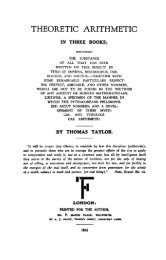The Mystical Hymns of Orpheus - Platonic Philosophy
The Mystical Hymns of Orpheus - Platonic Philosophy
The Mystical Hymns of Orpheus - Platonic Philosophy
You also want an ePaper? Increase the reach of your titles
YUMPU automatically turns print PDFs into web optimized ePapers that Google loves.
14 THE MYSTICAL HYMNS<br />
Goddess <strong>of</strong> phantoms and <strong>of</strong> shadowy play,<br />
Whose drowsy pow'r divides the nat'ral day ;<br />
therefore, symbolically, calls these hundred-handed, as touch-<br />
ing all the fabrication <strong>of</strong> things, and being the causes <strong>of</strong> it.<br />
<strong>The</strong> triad *, however, <strong>of</strong> the Centimrtni is <strong>of</strong> a guardian<br />
nature. But Plato adduces negatively what he found cele-<br />
brated affirmatively by the theologist. For what <strong>Orpheus</strong><br />
calls Night, that Plato denominates without colour. And<br />
what the former says negatively is without fulsehood,<br />
Prediction without falsehood was to Night<br />
Of all things giv'n. [says <strong>Orpheus</strong>.]<br />
that the latter celebrates, as having a6out it the genus <strong>of</strong> tme<br />
science, and as being truly existing essence. Plato also, having<br />
celebrated the supercelestial place by three negations, again<br />
adduces three affirmations, introducing three <strong>of</strong> them from<br />
being. For, since this order is a triadic one, Plato very<br />
properly preserves the triadic, both in the negative and<br />
affirmative conclusions. Or it may be said that, since it is<br />
both one and bring, and is triadic according to each <strong>of</strong><br />
these, he indicates the negative conclusions according to<br />
the superessential one, but the affirmative according to<br />
being. Here likewise the first number is unfolded into<br />
light.<br />
In the next place Hermeas enumerates the different kinds<br />
<strong>of</strong> Truth, as follows : "Superior illuminate subordinate<br />
natures with the light <strong>of</strong> Truth. We must extend the eye<br />
<strong>of</strong> intellect therefore to these four ; viz. the one, which is<br />
the first principle <strong>of</strong> things ; Phanes, who is the boundary<br />
<strong>of</strong> the intelligible, but the exempt principle <strong>of</strong> the intellec-<br />
tual Gods (for the Nights are principles with which prin-<br />
ciple is co-ordinate) ; Jnpiter, who is the king <strong>of</strong> the super-<br />
mundane, but the boundary <strong>of</strong> what are properly called the<br />
* This triad consists <strong>of</strong> Cottus, Gyges, and Briareus.

















